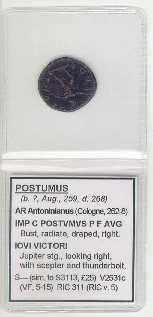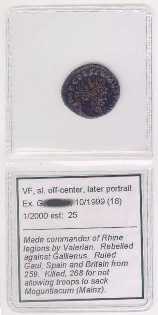Brad's Introduction to Ancient Coins
This page will briefly discuss how to buy ancient Roman coins.
I have only a few coins for sale.
Click here for my sale list.
If you have never purchased a Roman coin before, you might
think that Roman coins, being roughly two-thousand years old,
are rare, expensive, and not available for purchase. If so,
you would be wrong for the most part. A wide variety of Roman
coins are available for purchase for under one hundred dollars,
with many nice examples in the twenty-five to one-hundred dollar range.
There certainly are Roman and other ancient coins in many
museums, and rare coins that are very expensive, but there
are hundreds of varieties of ancient coins that cost less
than dinner for two at a nice restaurant (though telling
your spouse that you'd want to buy an ancient coin rather
than go out for dinner is not recommended).
You might also think that any Roman coins that you are offered
are counterfeit. While this is a concern, it is not a large
one if you stick with long-time coin dealers that specialize
in ancient coins. While you may not be an expert in
detecting forgeries, they are, and those with a bad reputation
do not last long. To give you more confidence, however,
I have a page covering a little information on
Fakes and Authentification.
The most likely place that you would be
offered a forgery for sale is near archeological sites in
Europe or Asia. Many of the countries near these sites prohibit
the sale or export of authentic ancient coins, but
the sale of forgeries is not prosecuted, so many
unsuspecting tourists are taken in, thinking they have purchased
a great rarity for little (or perhaps much) money. They may
also have trouble with customs while leaving the country.
So rule number one is "don't purchase ancient coins from outside
of the country you live in unless you are knowledgeable of the
relevant laws of all the countries you will be traveling through
before, and including when you arrive back home."
There are also some forgeries for sale on Internet auction
sites. Again, you must know the reputation and experience
of the person you are buying from. This brings us to rule
number two, "if you don't know your ancients coins well,
know your ancient coin dealer."
Most ancient coin dealers sell through coin shows,
the Internet, or the mail, so you are unlikely to find an
ancient coin dealer with a storefront in your area.
So how do you find them?
First try searching for a local ancient coin collectors'
club. Some larger cities have them.
If there isn't one, go to a large coin show.
A good sized city should have some larger shows that
will have at least a few dealers who specialize in
ancient coins. If they mostly sell other coins and
have just a few ancients, be careful, especially if
all the coins they have look very new.
Many collectors begin with ancient coins by buying a
number of uncleaned ancient coins. These are appeare
in incredible numbers in the 1990s due to the need
for cash in the countries of Eastern Europe, and
the widespread availability of metal detectors.
Most of these are real, but very poor (and dirty)
examples of the later Roman Imperial coins.
Modern coins should never be cleaned, but it different
with ancients since they all came from the ground where
they've often been for two-thousand years.
If you have the skill and patience to clean them, which often
takes over a year, you will most often have a very worn
common coin that is worth a few dollars, if you haven't
ruined it in the process. After doing this once, I decided
that I'd rather spend twenty-five to fifty dollars for one
coin that was already professionally cleaned,
and in nicer condition.
So what do you need to know to buy a Roman coin?
-
You need to find a dealer that sells the area you are looking
to purchase. Some dealers only sell the rarer coins that go
for hundreds or thousands of dollars. These would not be good
if you are intending to purchase one or two common coins.
Other dealers may specialize in Greek or Eastern empires.
Some dealers sell off fixed priced lists, and others at auction.
Find one that has a good reputation and matches your interests
and has coins in your price range.
-
If you want to have a rough idea if you are getting a fair deal,
you must know how to identify and grade the coins you purchase.
I have separate pages that introduce these subjects, though
these skills take quite a long time to develop fully.
Handling and Storage of Ancient Coins
If you don't want to ruin coins once you have purchased them,
you should know how to handle them properly.
Hold them only by the edges, and when your hands are clean and dry.
Do not clean them in any way unless you know the proper
techniques for cleaning ancients, and how to know if
a particular coin should even be cleaned at all.

 Two of the most popular ways to store
ancient coins are mylar (non-PVC) containers ("flips")
or acid-free small paper envelopes.
I use flips because it allows for easier viewing of the
coin, and the insertion of a printed label giving identification
and other information about the coin.
The two sides of a flip, shown opened up, are at left and right.
When folded back up, these two inch by two inch flips
can be store in a plastic page that holds 20 of them,
and these pages are made to fit in a three-ring binder.
I find this very convenient all around.
Two of the most popular ways to store
ancient coins are mylar (non-PVC) containers ("flips")
or acid-free small paper envelopes.
I use flips because it allows for easier viewing of the
coin, and the insertion of a printed label giving identification
and other information about the coin.
The two sides of a flip, shown opened up, are at left and right.
When folded back up, these two inch by two inch flips
can be store in a plastic page that holds 20 of them,
and these pages are made to fit in a three-ring binder.
I find this very convenient all around.
I think both flips and paper envelopes are for sale
by Brooklyn Gallery,
but be sure to check that what you buy is safe for the long term.
I have not purchased from them, so do not consider this
a personal recommendation.
Continue to Fakes and Authentification.
If you have any questions or comments, please
send e-mail to me at
 .
.
Last updated January 25, 2024.
visitors.

 Two of the most popular ways to store
ancient coins are mylar (non-PVC) containers ("flips")
or acid-free small paper envelopes.
I use flips because it allows for easier viewing of the
coin, and the insertion of a printed label giving identification
and other information about the coin.
The two sides of a flip, shown opened up, are at left and right.
When folded back up, these two inch by two inch flips
can be store in a plastic page that holds 20 of them,
and these pages are made to fit in a three-ring binder.
I find this very convenient all around.
Two of the most popular ways to store
ancient coins are mylar (non-PVC) containers ("flips")
or acid-free small paper envelopes.
I use flips because it allows for easier viewing of the
coin, and the insertion of a printed label giving identification
and other information about the coin.
The two sides of a flip, shown opened up, are at left and right.
When folded back up, these two inch by two inch flips
can be store in a plastic page that holds 20 of them,
and these pages are made to fit in a three-ring binder.
I find this very convenient all around.
 .
.